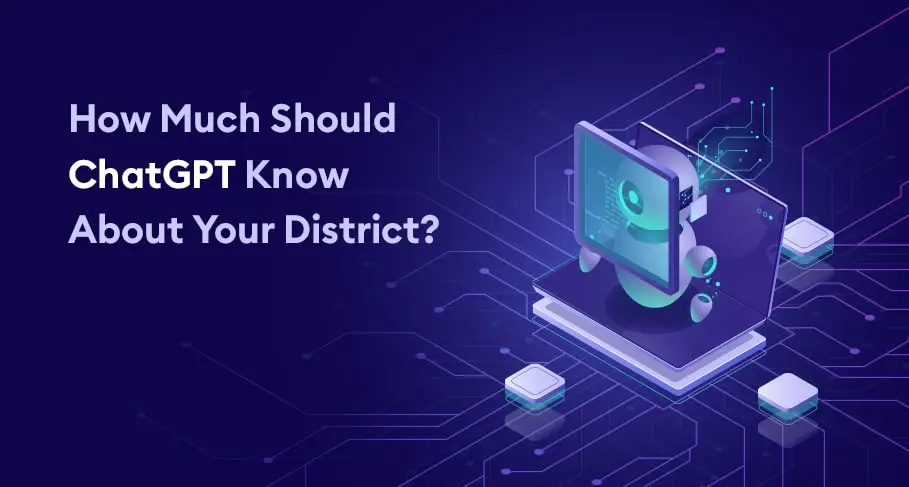Discussion of the artificial intelligence language model ChatGPT seems impossible to escape these days.
Examples of AI making humans uncomfortable abound, especially considering children and schools. The massively unpopular Snapchat My AI chatbot prompted a barrage1 of single-star reviews and warnings to parents from local law enforcement. Schools are already plagued by cheating2, which seems to be a chief argument against ChatGPT in classrooms (although its touch can be detected3). Ultimately, artificial intelligence is the opposite of thought leadership4. It’s no wonder we feel the temptation to underestimate the impact of AI in school communication.
However, AI exists to be useful, like any other tool. It has the potential to help us do amazing things5 in school districts and beyond—evidenced by widely trusted edtech pioneer Sal Kahn’s foray into AI as a guide for students. Its insight may even prove useful to district leaders deciding how to handle AI in their schools.
When asked how a business should use ChatGPT, the AI did its job well and responded with thought-provoking answers.
I am not human.
“Firstly, relying solely on a language model for communication can lead to a loss of human touch.”
The human touch the AI is referring to is both easy and hard to describe. The human touch feels like fallibility, humility, design thinking, mistakes, and imperfections. It is the spirit of collaboration. It is teamwork and dreamwork. It’s also the wisdom to understand the nuances of communication6: the differences between fact, rhetoric, opinion, and belief. The wherewithal to understand that not everything we read is true, and the education to identify what is research-based, peer-reviewed, and fact-checked vs. what is simply written.
Using AI to detect AI is not flawless either. In fact, even a paid model7 seems slightly more prone to credit AI even when humans generate the content. (A free model was closer to 60%8 accurate.)
Humans set the definition of reality. Artificial intelligence is, by default, a derivative of all the knowledge we’ve already discovered. The new horizons of thinking will come from humans adding knowledge, not AI thinking up something new.
The lesson: Think of AI as a tool, nothing more.
I am not secure.
“Secondly, the use of a language model raises concerns about data privacy and security.”
The robot tells on itself. Listen.
By design, the AI takes in the data humans provide, keeps it, and creates answers based on what it has learned. It’s not in the business of forgetting confidential information and will build upon what it has been taught.
It will not evaluate its answers for objective accuracy or for security.
The lesson: Never tell an AI confidential information.
I am inaccurate.
“Thirdly, while I am capable of generating a large amount of content, the quality and accuracy of that content may vary.”
Logic dictates what the model returns. You may have heard this described in computer science terms as garbage in, garbage out. The AI learns what people teach it, and if people teach it poorly, it will produce increasingly twisted results. It can only learn what it’s taught.
Plenty of people can talk a lot and say nothing, and this AI can too. It might not be fact, although we’re tempted to think of machines as infallibly accurate9.
Except it’s not. Google Bard’s inaugural demo inaccurately claimed10 the James Webb Space Telescope took the first pictures of exoplanets when it was actually the European Southern Observatory in 2004 (confirmed by NASA). ChatGPT’s limitations may also prevent it from answering prompts accurately to human knowledge unless they’re phrased very specifically—one example11 inquires how many countries start with the letter V, and the chatbot doubles down on its answer of zero (turns out Vietnam, Vatican City, and Venezuela don’t fit the definition of “country”—a rather pedantic distinction the average non-geographer would probably not make).
We already know how dangerous and isolating algorithms12 can be. To clarify, AI itself is not inherently bad or evil. It is simply providing a culmination of what humans have taught that particular engine. In the hands of trustworthy and ethical experts, the potential is limitless and ostensibly good—but there are no guarantees. An AI is not going to temper bias; on the contrary, AI is already being used to radicalize.
The lesson: Always fact-check with real sources from humans.
I am not going away.
AI is not going anywhere. The question is, what knowledge are you going to provide it with?
A discerning reader may notice the ChatGPT language model is more human than we’d like to think it is: humans are notoriously inaccurate and pose the biggest threat to data security. So what’s the difference, really, between AI and humans, in terms of the danger of concocting and spreading misinformation and mishandling private data? (Training humans13 can help, for one.)
At least in school districts, the major difference might just be the ability to value the truth, each other, and humanity in general. Tread lightly.
Links
- https://techcrunch.com/2023/04/24/snapchat-sees-spike-in-1-star-reviews-as-users-pan-the-my-ai-feature-calling-for-its-removal/
- https://study.com/resources/chatgpt-in-the-classroom
- https://www.digitaltrends.com/computing/gptzero-how-to-detect-chatgpt-plagiarism/
- https://www.forbes.com/sites/shanesnow/2023/05/05/ai-writing-is-the-opposite-of-thought-leadership/?sh=423d97879eaf
- https://interestingengineering.com/innovation/khan-academy-visions-humble-ai-to-be-students-special-guide-not-cheat
- https://www.skyward.com/discover/blog/skyward-blogs/skyward-executive-blog/january-2019/7-news-literacy-strategies-for-all-ages
- https://www.demandsage.com/how-to-identify-ai-written-content/
- https://www.demandsage.com/how-to-identify-ai-written-content/
- https://www.skyward.com/discover/blog/skyward-blogs/skyward-executive-blog/november-2021/do-we-do-our-best-work-for-machines
- https://www.npr.org/2023/02/09/1155650909/google-chatbot–error-bard-shares
- https://www.reddit.com/r/ChatGPT/comments/11709xq/chat_gpt_giving_wrong_answers_to_an_easy_question/
- https://www.internetmatters.org/hub/news-blogs/what-are-algorithms-how-to-prevent-echo-chambers/#:~:text=Algorithms%20are%20an%20important%20part,online%20hate%2C%20misinformation%20and%20more.
- https://www.skyward.com/discover/blog/skyward-blogs/skyward-executive-blog/september-2021-(1)/let-s-take-a-phishing-trip


